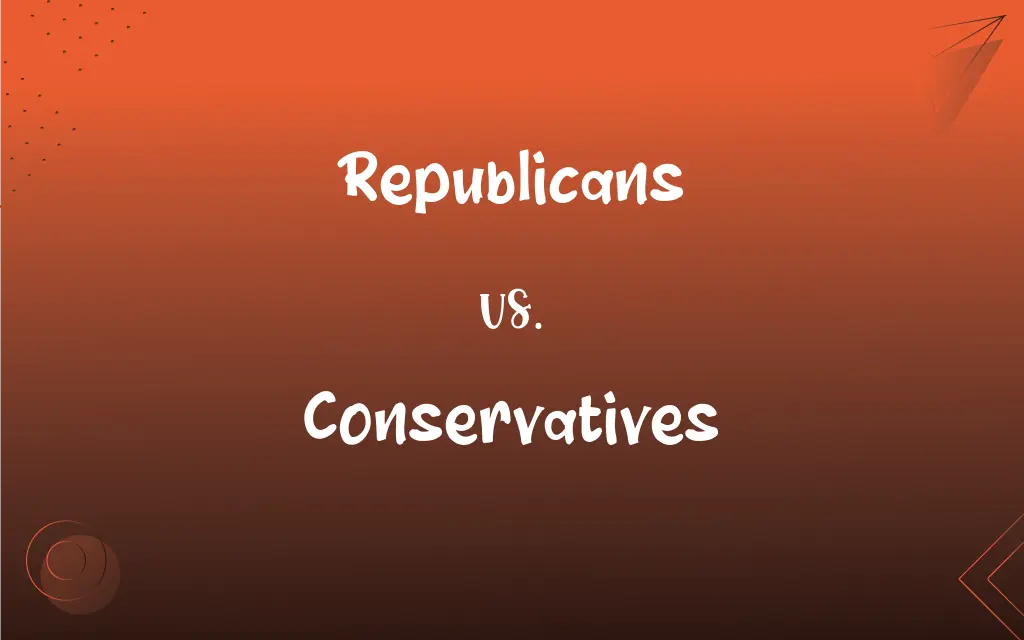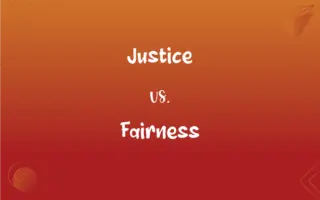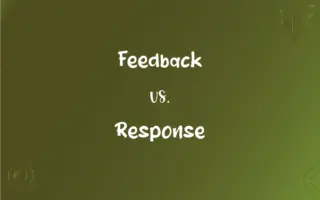Republicans vs. Conservatives: What's the Difference?
Edited by Harlon Moss || By Janet White || Published on December 29, 2023
Republicans refers to members of the Republican Party, a major U.S. political party. Conservatives refers to individuals favoring traditional values and resistant to change.

Key Differences
Republicans are members or supporters of the Republican Party, one of the two major political parties in the United States, known for its conservative policies. Conservatives, however, can be members of any party, including the Republican Party, and are characterized by their preference for traditional values and resistance to rapid change.
The Republican Party as a whole encompasses a range of political views, including but not limited to conservatism. Conservatives are defined more by their ideological stance, emphasizing traditionalism, and often advocating for limited government intervention.
Republicans operate within a specific organizational and political framework, participating in elections and policy-making. Conservatives, on the other hand, represent a broader ideological perspective that can influence various aspects of society and politics, not limited to a single party.
Many Republicans align with conservative principles, while the party also includes moderates and members with varying stances on social and economic issues. Conservatism as a philosophy can be found across different political parties and is not restricted to the Republican Party.
The Republican Party has specific policy platforms and candidates representing its views in political processes. Conservative ideology, while influential in the Republican Party, is also a standalone set of beliefs that can exist outside the confines of party politics.
ADVERTISEMENT
Comparison Chart
Political Affiliation
Specifically affiliated with the Republican Party
Can be affiliated with any party or none
Scope
Political party with defined organizational structure
Broad ideological stance
Policy Influence
Direct through party policy and elected officials
Indirect through ideological influence
Ideological Spectrum
Includes conservatives but also moderates and others
Specifically adheres to traditional values
Operational Framework
Engaged in electoral politics and governance
Influence seen in various societal domains
ADVERTISEMENT
Republicans and Conservatives Definitions
Republicans
Participants in the Republican political and electoral processes.
Republicans voted in the primaries for their preferred candidate.
Conservatives
Individuals who favor traditional values and are generally resistant to change.
Conservatives opposed the new progressive legislation.
Republicans
Supporters of the Republican Party's policies and candidates.
Republicans rallied for tax reform legislation.
Conservatives
Supporters of social and economic policies that uphold traditional institutions.
Conservatives campaigned to preserve historical monuments.
Republicans
Members of the Republican Party, a major U.S. political party.
The Republicans gained a majority in the Senate.
Conservatives
Adherents to conservative philosophy in politics, culture, or religion.
The conservatives in the community upheld traditional family values.
Republicans
Individuals who identify with the Republican Party's ideology.
The Republicans in the town promoted free-market principles.
Conservatives
Individuals who prioritize stability and continuity over rapid or radical change.
Conservatives voiced concerns over the rapid changes in education policy.
Republicans
Adherents to the values and principles often associated with the Republican Party.
As Republicans, they supported stronger national defense policies.
Conservatives
People advocating for limited government intervention and free-market principles.
The conservatives pushed for deregulation of the industry.
Republicans
Of, relating to, or characteristic of a republic.
Conservatives
Favoring traditional views and values; tending to oppose change.
Republicans
Favoring a republic as the best form of government.
Conservatives
Traditional or restrained in style
A conservative dark suit.
Republicans
Republican Of, relating to, characteristic of, or belonging to the Republican Party of the United States.
Conservatives
Moderate; cautious
A conservative estimate.
Republicans
One who favors a republic as the best form of government.
Conservatives
Of or relating to the political philosophy of conservatism.
Republicans
Republican A member of the Republican Party of the United States.
Conservatives
Belonging to a conservative party, group, or movement.
Republicans
Plural of republican
Conservatives
Conservative Of, designating, or characteristic of a political party founded on or associated with principles of social and political conservatism, especially in the United Kingdom or Canada.
Conservatives
Conservative Of or adhering to Conservative Judaism.
Conservatives
Tending to conserve; preservative
The conservative use of natural resources.
Conservatives
One favoring traditional views and values.
Conservatives
A supporter of political conservatism.
Conservatives
Conservative A member or supporter of a Conservative political party.
Conservatives
Plural of conservative
FAQs
What defines a Republican?
A Republican is a member or supporter of the Republican Party in the U.S.
Can a Democrat be a conservative?
Yes, conservatism is an ideology that can be held by individuals in any party.
What is a conservative?
A conservative is someone who favors traditional values and often resists rapid change.
What do conservatives believe in?
Conservatives typically believe in traditional values, limited government, and free-market principles.
Do Republicans have a uniform ideology?
No, there is ideological diversity within the Republican Party.
Are all Republicans conservatives?
Not all; the Republican Party includes a range of views, including conservative.
Are Republican views static?
No, the views within the Republican Party can evolve over time.
What are typical Republican policies?
Generally, they include economic liberalism, strong national defense, and conservative social policies.
What is the conservative stance on government intervention?
Conservatives usually advocate for limited government intervention.
What is the Republican Party’s stance on social issues?
They tend to lean towards more traditional views on social issues.
Can conservatives influence policy outside the Republican Party?
Yes, conservative ideas can influence policies across different parties and sectors.
Is the Republican Party only in the United States?
Yes, it's a specific political party unique to the United States.
Can Republicans support progressive policies?
Some Republicans may support certain progressive policies, reflecting the party's ideological diversity.
How do Republicans participate in politics?
Through party activities, elections, and governance.
How do conservatives view cultural change?
They often prefer gradual change that respects traditions.
What role do conservatives play in society?
They often uphold and advocate for traditional values and practices in various societal aspects.
Are all conservatives religious?
No, while many conservatives hold religious values, it's not a requirement for conservatism.
How do Republicans approach international policy?
Republicans typically emphasize strong national defense and assertive foreign policies.
Do conservatives always oppose change?
Not necessarily; they may support change that aligns with traditional values or is gradual.
Do conservatives support economic regulation?
Generally, conservatives favor less economic regulation and more free-market approaches.
About Author
Written by
Janet WhiteJanet White has been an esteemed writer and blogger for Difference Wiki. Holding a Master's degree in Science and Medical Journalism from the prestigious Boston University, she has consistently demonstrated her expertise and passion for her field. When she's not immersed in her work, Janet relishes her time exercising, delving into a good book, and cherishing moments with friends and family.
Edited by
Harlon MossHarlon is a seasoned quality moderator and accomplished content writer for Difference Wiki. An alumnus of the prestigious University of California, he earned his degree in Computer Science. Leveraging his academic background, Harlon brings a meticulous and informed perspective to his work, ensuring content accuracy and excellence.






































































